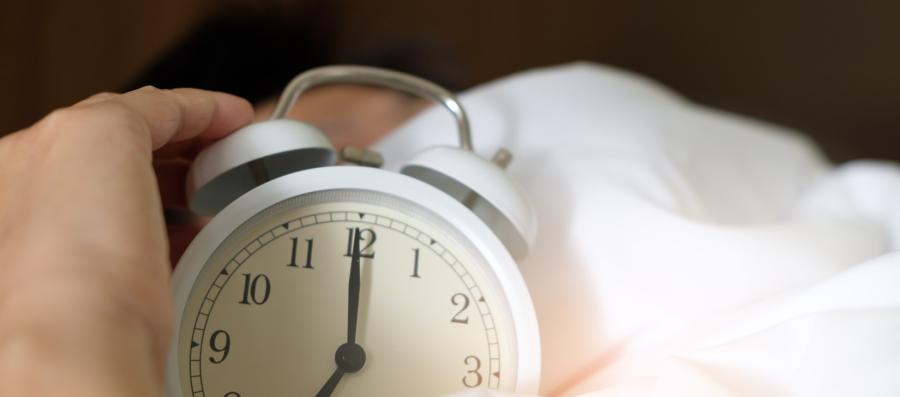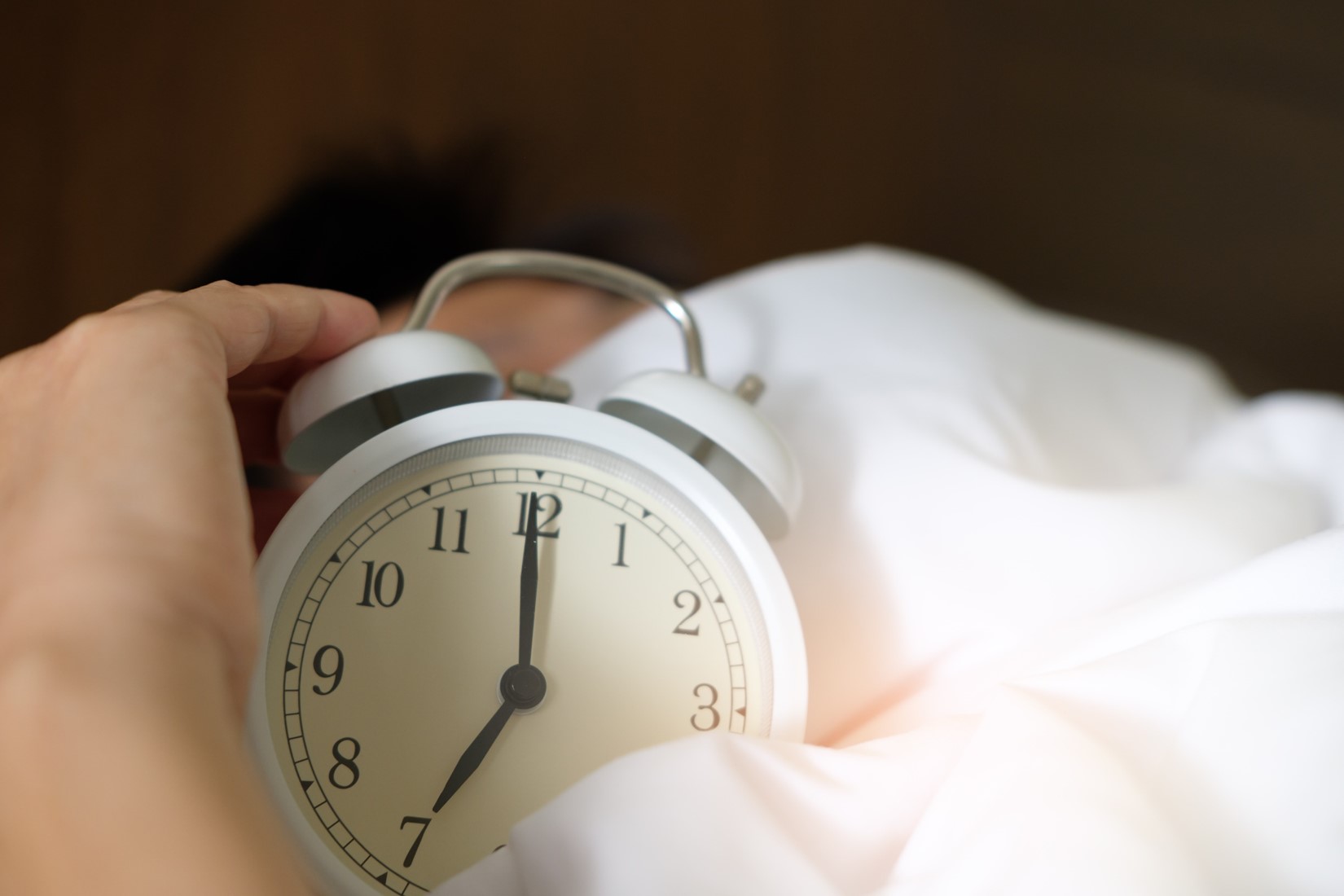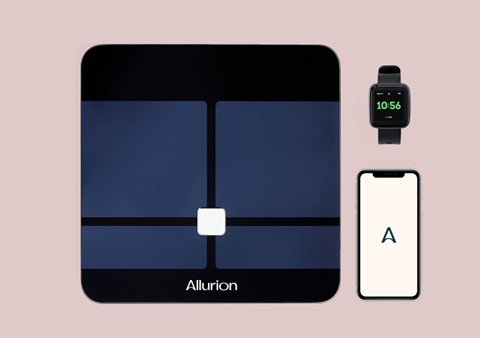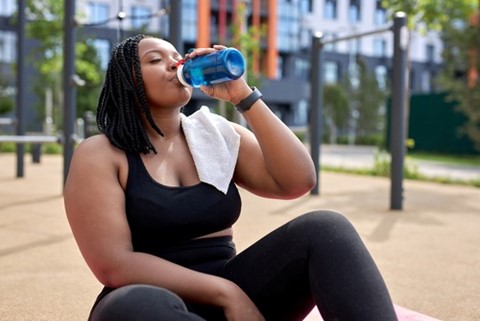Allurion | The Benefits of Deep Sleep

The Benefits of Deep Sleep
Why do we care about sleep? How much sleep you get has a major impact on day-to-day life regardless of your weight. A lack of sleep – or poor-quality sleep – can have a negative effect on your overall quality of life and wellness.
But sleep is especially important to the weight-loss journey1 .Getting a healthy quality and quantity of sleep can help set you up for success on your weight-loss journey and ensure you’re well placed to achieve your weight-loss goals.

How much sleep is enough sleep?
The recommended amount for adults is 7 to 9 hours each day. Research shows that 7-9 hours every night allows adults to be fully rested and productive the next day.1 Even so, there is no perfect number that works for everyone.
Sleep requirements vary from person-to-person and are based on lots of factors, including age, genetics, environment and behavior. How many hours you need also depends on the quality of your sleep. You may get 8-9 hours of sleep a night, but if it’s poor quality, you still may not feel rested during the day.2 So think about quantity AND quality!
How to know if you’ve had enough sleep
When you get enough quality sleep, you’re better equipped to feel your best, do your best and live your best life. You know you’re getting enough quality sleep when you’re not tired during the day and you’re able to function at your best.2 Still not sure? Ask yourself a few key questions:
- Do you wake up and feel refreshed?
- Are you tired during the day?
- Does being tired stop you from being as productive as you’d like?
If you’re getting a good 7-9 hours’ sleep a night but not feeling at your best during the day, it may be a good idea to chat to your doctor.

Sleep and the Allurion Program
Tracking your sleep is easy with the sleep tracker function via Apple’s health-integrated trackers and the Allurion Health Tracker. Your sleep duration (hours and minutes) is fed into your Allurion App for you to see – and into your clinic team’s platform (called Allurion Insights) for your clinic team to see. Together, you can work on goals that are right for you to help improve your sleep quality and quality – to and support your overall weight-loss journey.
Effects of sleep on emotions and eating habits
It’s crucial to recognize the link between sleep and emotions, and to understand how closely they’re connected. A lack of sleep can affect mood and brain function, and lead to poor decision-making. When you’re tired and not getting enough sleep, you may find yourself making poor food choices – such as eating more snacks and sugary foods than you usually would. 3,4
There’s also growing evidence to show that consistently getting less than 6 hours’ sleep a night may alter the hormones that regulate your hunger and appetite, and influence your healthy eating habits. 3,5,6
Sleep and your activity levels
Poor sleep can affect other key areas of your weight-loss journey, such as your ability to exercise and stay active. We know that regular exercise can support not only weight loss but weight-loss maintenance too. The science is also clear that being active is beneficial for your sleep quality. Regular physical activity can help you fall asleep faster and improve the quality of your sleep.7

More research is needed to fully understand the effect that sleep has on physical activity, but – as you may have experienced – you tend to feel less motivated to exercise when you’re tired, which means you may end up spending more time being inactive.8
Sleep and your overall health
Getting quality sleep is crucial to feeling your best, doing your best and living your best life. A lack of sleep can make the challenges of day-to-day life more difficult to manage – and this may also make it harder to balance your weight-loss program with other commitments.
The average person will spend about one-third of their life sleeping. As sleep affects almost every part of the body – from the brain to the heart and immune system – it also impacts your overall quality of life. It can affect things like work, study, family and your mood.9,10
When you’re not getting enough quality sleep, you may feel more stressed or irritable, or be unable to concentrate properly or think creatively.3 A lack of sleep can also make dealing with stressful events more difficult.3 At the same time, stress can lead to lower sleep quality. This can become a vicious circle, which is why it’s especially important to get sufficient rest during times of anxiety and stress, or during periods of change, such as committing to a new weight-loss program.

What’s more, not getting enough quality sleep puts you at higher risk for a long list of chronic diseases, including high blood pressure, heart disease, type 2 diabetes, depression and obesity.3
If you have a sleep disorder such as insomnia or sleep apnea, seek advice from your doctor on strategies to help you.
Sleep – your questions answered!
How can I get a better night’s sleep?
There are a few tricks to help you get a good 7-9 hours of uninterrupted sleep every night. That means a peaceful sleep during which you only wake up a few times.11
- Firstly, try and keep consistent bedtimes and wake-up times – even on the weekends.
- Keep your bedtime routine the same – for example, have a warm bath or your last cup of tea (decaf may help) at the same time every night.
- Make your bedroom a sleep zone – not a work or entertainment zone. Turn off tech well before bedtime. Computers, tablets and phones send out strong blue light that tricks your brain into thinking it’s still daytime – read a book, listen to relaxing music or write in your journal instead.
- Keep your bedroom cozy and cool – a haven just for sleep.12
Does eating before bedtime affect sleep?
Avoid large meals two or three hours before bedtime because they can result in indigestion, acid reflux and heartburn. They can also lead to poor sleep quality thanks to extra trips to the bathroom in the night. That said, being hungry at night can also affect your sleep, so it’s important to find a balance that works for you. If you’re hungry, opt for a smaller, lighter nighttime snack.12,13
On the Allurion Program, to help avoid reflux, we recommend that you eat early in the evening and avoid lying down soon after eating – waiting around 2-3 hours before going to bed. Propping yourself up with pillows can also help, while sleeping on your left side can help you to feel more comfortable.

Why is tracking your sleep helpful?
Tracking your sleep can help you to become more aware of your sleep patterns. It can help you answer questions like: Am I getting the recommended 7-9 hours of sleep a night? Am I going to bed and waking up around the same time every day? How do I feel in the mornings? Are there certain nights of the week I don’t sleep well? Why is that?
By looking at these patterns, you can learn to work out what’s working and what’s not when it comes to sleep. That in turn can help you to work out what you could change – and to set goals to get there. When tracking your sleep, don’t worry about being perfect and inputting the exact time that you woke up or fell asleep. In fact, you shouldn’t watch the clock at night at all, since ‘clock watching’ can interfere with getting a good night’s sleep. Research has found that tracking consistently is more helpful than exact accuracy.15 Your Allurion Health Tracker can monitor your sleep for you.
Does alcohol affect sleep?
While it may seem that having a few drinks before bed helps you fall asleep faster and sleep better, the opposite is actually true. Studies have consistently found that drinking alcohol – even small amounts – near bedtime makes it harder to fall asleep. It can also result in you waking up more often, plus it can stop you getting a deep sleep. However, as with most things, alcohol affects people differently. How your sleep is affected may depend on the amount you drink and when you drink it, as well as on your tolerance levels and your typical alcohol habits.14

Does caffeine affect sleep?
Drinking caffeine close to bedtime can disrupt your sleep, but it differs from person to person. Individual responses to caffeine vary and its impact on your sleep can depend on factors like how much caffeine you drink during the day and your tolerance levels.
If you’re used to drinking a lot of caffeine, a small amount before bed may not affect your sleep. However, if you’re more sensitive to it, it could result in a disrupted sleep.14 It may take some trial and error to work out how much caffeine you can drink – and when – without it affecting your sleep. Instead of a caffeinated coffee or tea at bedtime, try herbal teas like chamomile or lavender to help relax you.12
Does nicotine affect sleep?
Nicotine is a stimulant that promotes wakefulness – it can impair your sleep, especially in high doses. Studies have found that using nicotine can make it harder to fall asleep, leading to less sleep. It can also lead to you waking up more often during the night. Unlike caffeine, which may not affect your sleep as much if you’re a regular caffeine user, nicotine can impact sleep even if you have a high tolerance for it. That’s why it’s recommended to avoid nicotine – including smoking, pills and patches – to get better sleep. It’s worth noting, too, that if you’ve recently stopped using nicotine, you may find that your sleep is disrupted as you go through withdrawal.14
Does exercise before bedtime affect sleep?
The science is clear that staying active helps your sleep quality. Regular physical activity – no matter what time of day – has been shown to cut the time it takes to fall asleep. It also helps boost total sleep time and sleep quality.5 There’s a common belief that you shouldn’t exercise right before bedtime, but this isn’t true for everyone. If you’re a good sleeper, late-night physical activity may not affect your sleep at all. You should be active at the time of day that works best for you, as long as it doesn’t affect your bedtime routine. Just be aware of how the timing and intensity of exercise and take note of how it impacts your sleep.6
Does ‘napping’ affect sleep?
More research is needed to work out the exact effect napping has on night-time sleep.14 People respond to naps differently, so you should do what feels right to you. If you nap, try and pay attention to whether it affects your ability to fall asleep that night. The goal is to get 7-9 hours of uninterrupted sleep at night. If your naps get in the way of that, you may want to shorten your naps or cut them out altogether. As always, talk to your doctor if you have any question or concerns, especially if you’re getting 7-9 hours of sleep a night but still feeling tired during the day.
References
1. Medic G, Wille M, Hemels MEH. Short- and long-term health consequences of sleep disruption. Nature and Science of Sleep 2017;9:151-161. https://www.ncbi.nlm.nih.gov/pmc/articles/PMC5449130/
2. Markwald RR et al. Impact of insufficient sleep on total daily energy expenditure, food intake and weight gain. Proc Natl Acad Sci USA 2013;110:5695-700. https://www.pnas.org/content/pnas/110/14/5695.full.pdf
3. Taheri S, Lin L, Austin D, et al. Short sleep duration is associated with reduced leptin, elevated ghrelin, and increased body mass index (BMI). Sleep. 2004;27:A146-A147
4. Sharma S, Kavuru M. Sleep and Metabolism: An overview. Int J Endorcinol. 2010;2010:270832. https://www.ncbi.nlm.nih.gov/pmc/articles/PMC2929498/
5. U.S. Department of Health and Human Services. Physical Activity Guidelines for Americans. 2nd edition. Washington, DC: U.S. Department of Health and Human Services; 2018. https://health.gov/sites/default/files/2019-09/Physical_Activity_Guidelines_2nd_edition.pdf
6. Chennaoui M, Arnal PF, Sauvet F, Leger D. Sleep and exercise: a reciprocal issue? Sleep Med Rev. 2015;20:59-72. https://drive.google.com/file/d/1_zpPSq1gyGZXQ95rL3noe2xwSiTsGGCV/view
7. National Institute of Neurological Disorders and Stroke, National Institutes of Health. Brain Basics: Understanding Sleep. NIH Publication No.17-NS-3440-C. August 2017 Available at: https://catalog.ninds.nih.gov/pubstatic//17-NS-3440-C/17-NS-3440-C.pdf [file link no longer active]
8. National Sleep Foundation. 2013 International Bedroom Poll: Summary of Findings. Available at: https://www.sleepfoundation.org/sites/default/files/inline-files/RPT495a.pdf Accessed on: March 2, 2020 [file link no longer active]
10. Chaput JP, Dutil C, Sampasa-Kanyinga H. Sleeping hours: what is the ideal number and how does age impact this? Nat Sci Sleep 2018;10:421-430. https://www.ncbi.nlm.nih.gov/pmc/articles/PMC6267703/#!po=36.2069
11. Buysse DJ. Sleep health: can we define it? Does it matter? Sleep. 2014;37(1):9–17.
12. Sleep Foundation. Bedtime routine for adults. Available at https://www.sleepfoundation.org/sleep-hygiene/bedtime-routine-for-adults. Accessed on: June 28, 2022.
13. NIDDK. Treatment for GER & GERD. November 2014. https://www.niddk.nih.gov/health-information/digestive-diseases/acid-reflux-ger-gerd-adults/eating-diet-nutrition
15. Krukowski R, Harvey-Berino J, Bursac Z, Ashikaga T, West D. Patterns of success: Online self-monitoring in a web-based behavioral weight control program. Health Psychology. 2013;32(2):164-170.



